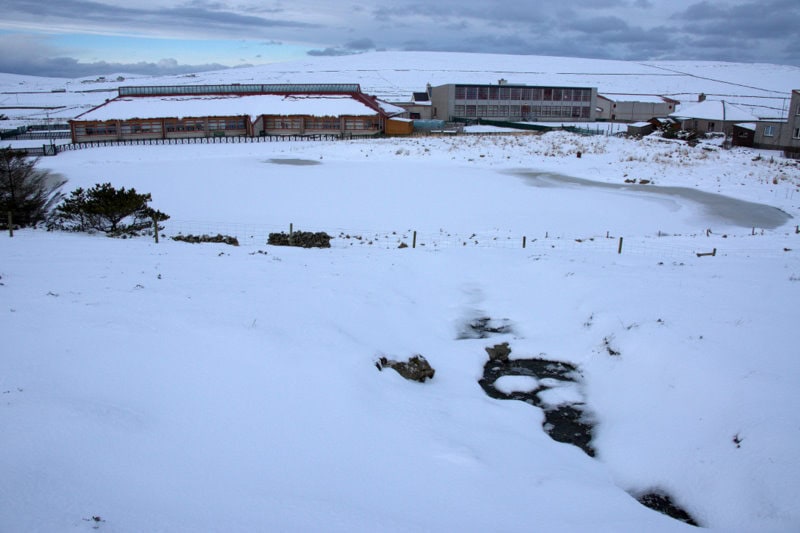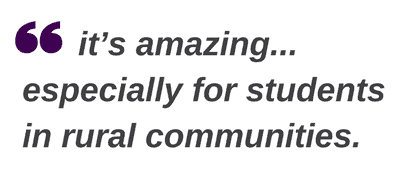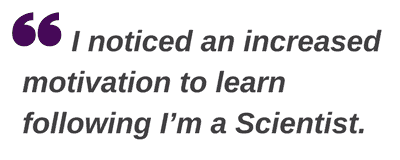“As we are a remote rural community we do not have a huge variety of careers on our doorstep but these events help to bring them closer to pupils. More students should be getting these funded opportunities across the UK.” – Emily Tulloch, Science teacher on the island of Unst.
 The most northerly school in the UK is located in one of our most distant areas in the Shetland Isles. Emily tells us how I’m a Scientist allowed her remote students to explore a range of STEM careers and increased motivation to learn science.
The most northerly school in the UK is located in one of our most distant areas in the Shetland Isles. Emily tells us how I’m a Scientist allowed her remote students to explore a range of STEM careers and increased motivation to learn science.
Why apply for I’m a Scientist?
“For me, it’s all about increasing Science Capital.” Emily often tries to provide STEM opportunities in school, particularly to help students broaden their understanding of careers, but it can be a challenge. “The STEM ambassador programme is great and we have a number of ambassadors based in Shetland. However there are significant barriers for them to reach the school – it can take almost a day to visit for a 1 hour talk and of course there’s the cost implication too.”

The school often rely on parents to demonstrate different careers to students “we’re lucky that our community is so supportive and parents working in STEM are very willing to visit the school, although the variety of careers is still limited on our island”. Emily wanted to use I’m a Scientist to increase the range of STEM roles her students find out about.
What did the students do?
The 17 students in S1-3 (Year 7-9) took part in the Molecule Zone this March. They read scientists’ profiles and posted questions to scientists on the site throughout the 2 weeks. Students also took part in a 30 minute live chat session where they typed their questions and responses to scientists online in real time.
Emily used the activity to connect to curriculum areas and the careers work going on in school. “It’s a broad activity so easy to link to something we’re doing or have just covered in class. I also tie I’m a Scientist into My World of Work, which our students access to find out where they could study the course or the career steps required for their preferred role.”
Did it work?
 Being online, I’m a Scientist provided a chance for Emily’s students to connect with scientists in a large variety of roles, generating interest in STEM careers without the need to travel. “They see different careers we don’t have in the local area by chatting with scientists all across the globe…There are lots of young people who live in remote areas compared to the rest of UK and they should all get same opportunities; this activity allowed me to provide this at no cost to the school.”
Being online, I’m a Scientist provided a chance for Emily’s students to connect with scientists in a large variety of roles, generating interest in STEM careers without the need to travel. “They see different careers we don’t have in the local area by chatting with scientists all across the globe…There are lots of young people who live in remote areas compared to the rest of UK and they should all get same opportunities; this activity allowed me to provide this at no cost to the school.”
Emily also told us how involvement in the activity has improved science learning in her classes “It’s engaging and stimulating for students to actually speak to live scientists doing real-life science and discuss what they think might happen in the future. When students are engaged and start to see the real life impact of a subject, they’re more enthusiastic about it – I noticed an increased motivation to learn following I’m a Scientist.”
What else did students gain?
Asking questions to the scientists allowed Emily’s students to “develop essential literacy and communication skills, particularly in the live chat where they have to consider how to engage in a group conversation” whilst “researching the scientists helped them learn how to find information online.”
Emily also commented on how the activity is good for students’ health and wellbeing, by using the internet chats as a relevant educational tool “students like communicating in this way online and this activity helps promote positive online communication and staying safe online, rather than fighting against social media and similar technology in school.”
What would you say to a teacher who is hesitant to take part?
“Give it a go – it’s amazing and you don’t realise the full impact before you take part but afterwards, you realise how hugely beneficial it is, especially for students in rural communities. The whole process has knock on effects for your science teaching as students are more engaged. It’s very stimulating for science and every pupil should have access to it.”
Distant (under-served) schools are given priority places in I’m a Scientist. To support your students in exploring a range of STEM careers with I’m a Scientist activities, register your interest here: imascientist.org.uk/teachers or contact katie@mangorol.la for more information.
Already registered? Don’t forget to apply for the next event – we email registered teachers when applications open (about 2 months before the event starts).

